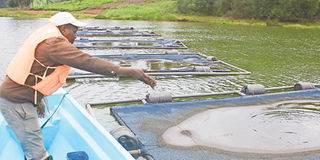Experts root for cage fishing as the solution to reduced production in Nyanza

Kenya has an annual fish deficit of up to 400,000 tonnes.
Experts in the fishing industry have raised the red flag over plummeting fish production in Nyanza when the region has the potential to produce enough for the national market and for export.
Kenya has an annual fish deficit of up to 400,000 tonnes, with every citizen consuming between three and four kilograms of fish annually when global per capita consumption is 12 kilograms.
It explains why the country has to import fish from China in order to meet local demand, which is still not being met.
The irony is that Nyanza is home to one of the largest lakes in the country and the world. It should be the main source of freshwater fish, but it cannot produce enough to meet the demands of residents of the four counties bordering it and beyond.
Experts said the lake has the potential to feed the whole country because it has perfect conditions for fish to thrive.
But this can only be achieved if new fishing techniques are introduced, because relying on wild catches is no longer sustainable.
Wild fish catches in Lake Victoria have plummeted by between 70 percent to 90 per cent in the last 15 years, said Victory Farms Chief Aquaculture Officer Steve Moran.
This means the vast lake with incredible resources has few economic benefits for people living around it.
One of the reasons for this deficiency is over-fishing, with vessels catching fish faster than nature can replenish them or using illegal fishing methods that kill fish before they mature.
Among the proposed solutions is cage fishing and Victory Farms, the largest fully integrated tilapia farm, is leading from the front.
"We have a brood stock and genetic programme where we breed the fish, nurture the fingerlings in ponds then later move them to cages in the lake until they mature for harvesting," Mr Moran said.
"Mature fish goes through another process where they are prepared ready for the market in 60 branches all over Kenya," he added.
When the company started its operations in 2015 at Rowo Beach in Suba sub-county, the local community saw it as a way of denying them access to the lake because the cages cover a large part of the water surface.
Over the years, the community began to see the benefits of cage fishing, as they have gained from the company’s community outreach under its corporate social responsibility programme. It has built schools, roads and health facilities and paid school fees for local children.
Victory Farms employs 600 people and plans to increase the number to more than 3,000 when it increases its production.
"We currently produce 8,000 tonnes of fish per annum. But we have the infrastructure and capacity to produce between 10,000 and 12,000 tonnes annually," Mr Moran said.
The company supplies at least 25 tonnes of fish throughout the country, said Chief Development Officer Caesar Asiyo.
He said there is still a huge deficit in supply.
He challenged people living on riparian land to get involved in aquaculture to bridge the gap.
On land, farmers in 15 counties are supported to produce fish in ponds under a government-sponsored aquaculture programme.
The Aquaculture Business Development Programme (ABDP), which is funded by the State Department for Fisheries, Aquaculture and the Blue Economy, has enabled farmers to increase fish supply.
ABDP Homa Bay coordinator Michael Omondi said the county, the largest fish producer, supplies 40,000kg of fish from ponds annually.
He said aquaculture, including cage fishing, produces 19,945 tonnes of tilapia annually.
"If every Kenyan was to eat four kilograms of fish every year, we would still need 40,000 tonnes of fish for the whole population of 45 million," he said.
ADBD is exploring how to support communities in cage farming while also regulating it, including method and location.
"We are … finalising regulations. We will soon roll out a suitability study for cages for communities which will come out later this month, before we approach donors to support the programme," Mr Omondi said.





